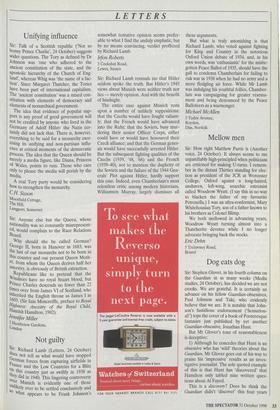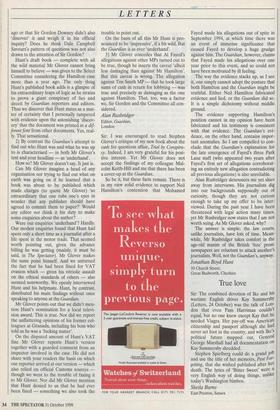Dog eats dog
Sir: Stephen Glover, in his fourth column on the Guardian in as many weeks (Media studies, 24 October), has decided we are not crooks. We are grateful. It is certainly an advance on his fellow Guardian-obsessives, Paul Johnson and Taki, who evidently believe that we are. It is notable that John- son's fastidious endorsement (`Sensation- al!) tops the cover of a book of Pooteresque fantasies just published by yet another Guardian-obsessive, Jonathan Hunt.
But Mr Glover's tone of reasonableness is deceptive: 1) Although he concedes that Hunt is an obsessive who has 'wild' theories about the Guardian, Mr Glover goes out of his way to praise his 'impressive' results as an inves- tigative journalist. The sole quoted example of this is that Hunt has 'discovered' that Hamilton only tabled nine written ques- tions about Al Fayed.
This is a discovery? Does he think the Guardian didn't 'discover' this four years
LETTERS
ago or that Sir Gordon Downey didn't also `discover' it and weigh it in his official inquiry? Does he think Dale Campbell Savours's pattern of questions was not also drawn to the attention of Sir Gordon?
Hunt's draft book — complete with all the wild material Mr Glover cannot bring himself to believe — was given to the Select Committee considering the Hamilton case more than a year ago. The only thing Hunt's published book adds is a glimpse of his extraordinary leaps of logic as he strains to prove a giant conspiracy of lies and deceit by Guardian reporters and editors. Thus we discover that Hunt states as a mat- ter of certainty that I personally tampered with evidence upon the astonishing 'discov- ery' that the document was printed in a dif- ferent font from other documents. Yes, real- ly. That sensational.
2) By contrast the Guardian's attempt to find out who Hunt was and what he was up to is characterised — in both Mr Glover's text and your headline — as 'underhand'.
How so? Mr Glover doesn't say. It just is.
Can Mr Glover imagine a head of any organisation not trying to find out what on earth was going on if he learned that a book was about to be published which made charges (to quote Mr Glover) 'so extraordinary that one rubs one's eyes in wonder that any publisher should have agreed to commit them to paper?' Would any editor not think it his duty to make some enquiries about the author?
Were our enquiries 'underhand'? Hardly. Our modest enquiries found that Hunt had spent only a short time as a journalist after a life spent in the motor trade. That seemed worth pointing out, given the advance billing he was getting (mainly, it must be said, in The Spectator). Mr Glover makes the same point himself. And we unturned the fact that he had been fined for VAT evasion which — given his vitriolic assault on the ethical standards of others — also seemed noteworthy. We openly interviewed Hunt and his helpmate. Hunt, by contrast, distributed his main findings without once speaking to anyone at the Guardian.
Mr Glover points out that we didn't men- tion Hunt's nomination for a local televi- sion award. This is true. Nor did we report the unflattering opinions of his former col- leagues at Granada, including his boss who told us he was a 'fucking nutter'.
On the disputed amount of Hunt's VAT fine Mr Glover reports Hunt's version together with a guarded comment from an inspector involved in the case. He did not share with your readers the basis on which our reporter arrived at our version — which also relied on official Customs sources though we went to the trouble of faxing it to Mr Glover. Nor did Mr Glover mention that Hunt denied to us that he had ever been fined — something we also took the trouble to point out.
On the basis of all this Mr Hunt is pro- nounced to be 'impressive', if a bit wild. But the Guardian is as ever 'underhand'.
3) Mr Glover concedes that Al Fayed's allegations against other MPs turned out to be true, though he inserts the caveat 'albeit less damaging than against Mr Hamilton'. But this caveat is wrong. The allegation against Tim Smith MP — that he took large sums of cash in return for lobbying — was true and precisely as damaging as the one against Hamilton. That, too, was a factor we, Sir Gordon and the Committee all con- sidered.
Alan Rusbridger
Editor, Guardian, London



















































































 Previous page
Previous page